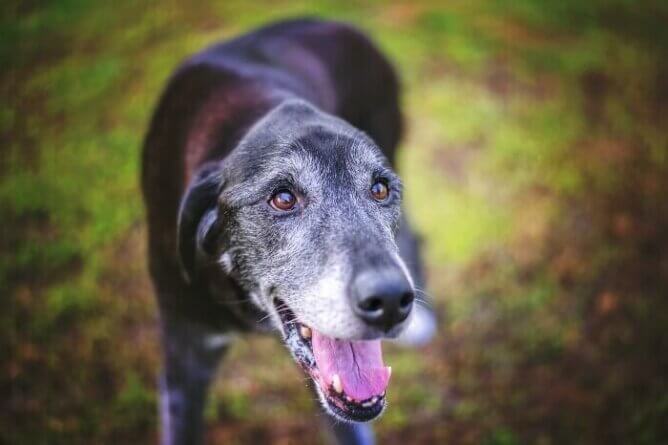How to Help a Senior Dog That’s Losing Weight

DogFoodAdvisor is reader supported See how
Dog Food Advisor is 100% impartial and is never paid to promote any brand. But if you buy using links on this page, we may earn a referral fee.
For people and dogs, age can bring changes in weight and body condition. And while keeping lean is a good idea for all of us, for some dogs, aging can mean undesired loss of weight and muscle mass — which might need help to be regained.
In senior dogs, weight loss can be caused by a range of factors, so you should consult your vet if you notice any changes in your older dog’s weight and body condition, especially if they’re accompanied by changes in appetite or energy.
Your vet can rule out a health condition, help you assess whether your dog actually needs to gain weight, and offer advice on keeping your dog fit and healthy. Although there are foods out there marketed for senior dogs, there isn’t a one-size-fits-all diet. But if your senior is otherwise healthy, there’s lots you can do to keep them interested in food, and to help them gain or keep weight.
We asked Brandon Stapleton, DVM, and head veterinarian for 5-star-rated The Farmer’s Dog, for his tips on helping older, underweight dogs gain a few pounds.
Check your senior dog is underweight
Measuring what a healthy weight looks like for your dog will depend on their breed and size, but generally, a dog is considered underweight if you can clearly see their ribs (learn more about doing a simple body condition test at home by watching this video).
Having said that, a dog can sometimes look thin or underweight to its owner when its weight would be considered as healthy by a veterinarian.
“Keeping your dog at a lean body condition and healthy weight is a big contributor to long-term health, and a healthy weight can be leaner than some dog owners think,” says Dr. Stapelton. “So your dog may not need to put on weight at all. Your veterinarian is the best person to help you assess that.”
Get your senior dog looked at by a veterinarian
As mentioned, the safest way to check whether your senior dog is underweight is to seek advice from a veterinarian. Your veterinarian can prescribe treatment if needed and give you professional advice about altering your dog’s diet to help their long-term health.
“This is particularly important if you’ve noticed a sudden drop in weight, energy or appetite, as this could indicate underlying health concerns including various gastrointestinal diseases, endocrine diseases, or even dental disease, to name a few,” says Dr. Stapleton.
Check your senior dog’s muscle mass
As well as confirming whether your dog is underweight, a veterinarian will be able to assess your dog’s Body Condition Score and Muscle Condition Score. Even if a dog is at a healthy body weight, their muscle mass can be lower than average and that may be detrimental to their health.
“A veterinarian will be able to indicate whether this loss in muscle mass is a sign of another medical condition and provide a treatment plan,” says Dr. Stapleton.
Changing your dog’s food can be beneficial
“There’s nothing wrong with keeping your senior dog on the same food they ate as an adult, if they’re doing well and maintaining a good body condition,” says Dr. Stapleton.
However, there can be multiple benefits to changing a senior dog’s food such as improving their appetite and boosting their nutrient intake. A food with high digestibility may also be a big boost (The Farmer’s Dog food has been proven to be highly digestible).
It’s not too late to switch foods, if called for
Just as you don’t need to automatically switch your dog’s diet when they hit their golden years, it’s also never “too late” if you do want to make a change.
“As long as your dog has no underlying health conditions that might require nutrient changes, or you’ve sought advice from a veterinarian and you feel confident that switching their food is the right thing to do, it’s never too late to switch their food,” says Dr. Stapleton.
Senior dogs require balanced food
“Senior dogs need a balanced, easily digestible diet with the right ratio of nutrients,” says Dr. Stapleton. “This can be supported by things like high-quality, human-grade protein which can support your dog’s digestion, hydration, and elimination.”
Also, fresh food can be softer and easier to eat for senior dogs as well as higher in moisture than dry food.
New food can increase your senior dog’s appetite
Palatability is important for senior dogs. “If you’re concerned that your dog has a reduced appetite which is causing weight loss, a change of food could be exactly what they need,” says Dr. Stapleton. Switching to a well-balanced, high-quality and highly palatable food might spark their appetite.
“Just ensure that you have ruled out any possible health conditions or behavioral explanations for your dog’s loss of appetite first,” says Dr. Stapleton. Naturally, this needs to be done in concert with your veterinarian.
You don’t have to keep worries to yourself
Caring for and living with a senior dog is a learning curve, as you adapt to their new behaviors and notice changes in them which can sometimes be disconcerting.
“Every dog ages differently but you know your dog better than anyone, so if you’re concerned about your senior dog losing weight or their appetite, never hesitate to reach out to your veterinary care team,” says Dr. Stapleton. “They can not only put your mind at ease and be a listening ear, but also make sure your dog is getting the best care possible.”
Final word
The Dog Food Advisor does not accept money, gifts, samples or other incentives in exchange for special consideration in preparing our reviews.
However, we do receive a referral fee from online retailers (like Chewy or Amazon) and from sellers of perishable pet food when readers click over to their websites from ours. This helps cover the cost of operation of our free blog. Thanks for your support.
For more information, please visit our Disclaimer and Disclosure page.



